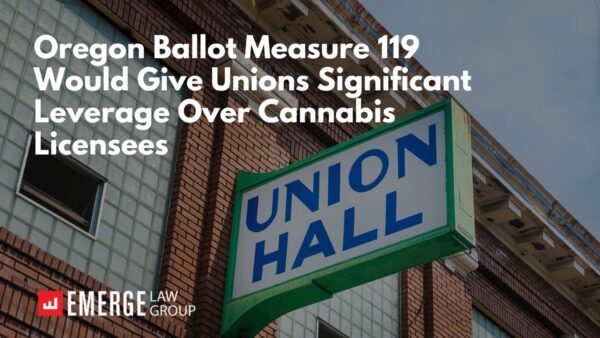Yesterday morning, Attorney General Jeff Sessions issued a memorandum upending existing federal policy regarding enforcement against states with legalized cannabis. Prior federal policy was set forth in several memoranda issued by the Justice Department under the Obama administration, including the widely-known 2013 Memorandum by then-Deputy Attorney General James Cole (“Cole Memo”).
This set of statements gave states and their constituents some assurance that their legalized-cannabis programs would not be targeted for federal prosecution, so long as the programs followed certain guidelines. Now, despite vague language suggesting some prosecutorial restraint, it appears that the federal government has taken a step backwards – where all cannabis activity, because it remains illegal under federal law (which it has been since the Controlled Substances Act of 1970), is vulnerable to federal enforcement as non-state-sanctioned activity – subject to enforcement discretion delegated to individual US Attorneys (“USAs”) and the DOJ’s financial and logistical limitations, which are substantial.
You can read more about the content of the January 4, 2018 Sessions Memo here.
Promisingly, the immediate political backlash against Sessions’ announced policy has been fierce. Elected officials from across the political spectrum widely criticized Sessions’ actions and vowed to protect their states’ legalized cannabis programs. Several USAs issued statements strongly indicating little, if anything, would change in their approaches to cannabis.
Looking specifically at California, which kicked off the country’s largest state-legal cannabis industry on January 1, 2018, Senator Kamala Harris, Lieutenant Governor Gavin Newsom, State Attorney General Xavier Becerra, and Congressional Representatives Barbara Lee, Adam Schiff, Nancy Pelosi, Ted Lieu, Ro Khanna, and Dana Rohrabacher (of the Rohrabacher-Farr/Blumenauer Amendment), all issued scathing statements yesterday, chastising Sessions and vowing to uphold the will of the People of California.
Less reassuring, however, were the responses from three of the four USAs for California. Brian Stretch, the USA for the Northern District of California, will leave his position tomorrow to join a private law firm. Stretch had been the last pre-Trump USA standing in California and has denied that his leaving relates to the Sessions Memo. Sessions will now be able to appoint an interim to Stretch’s abandoned post – for up to 120 days – until President Trump nominates, and the Senate confirms, a permanent replacement.
Following Stretch’s announced resignation, his office stated that it would work with “state, local, and federal law enforcement and allocate resources accordingly,” but did not indicate an uptick in state-legal cannabis prosectutions
The USA’s office for the Eastern District similarly said it would “evaluate violations of [federal] laws in accordance with our district’s federal law enforcement priorities and resources.”
The USA for the Central District, which includes Los Angeles, is under a new interim USA as of today — Nicola Hanna, appointed by Sessions — and has not commented on whether its office would change its policy toward cannabis prosecutions in response to the Sessions Memo. But Sessions did say that Hanna, “spent more than seven years [as an Assistant USA] taking on drug traffickers and other criminals.”
Of deeper concern, the USA for the Southern District, Adam Braverman (who was also appointed to an interim position by Sessions before being confirmed) issued a statement commending Sessions’ decision for “return[ing] trust and local control to federal prosecutors in each district when it comes to enforcing the Controlled Substances Act.” While the Sessions Memo purports to return to “well-established principles that govern all federal prosecutions” by eliminating “unnecessary” guidance, it also reiterates Sessions’ staunch position that cannabis’s lingering status as a Schedule I drug under the CSA means that “marijuana is a dangerous drug and that marijuana activity is a serious crime.”
And although prosecutorial decisions are ostensibly at the discretion of individual USAs, former USA Brett Tolman, a Republican from Utah, reported that the Justice Department is a top-down-policy, chain-of-command organization, and that the Attorney General has a strong hand in recommending federal prosecutors. As it stands in California, the fact that three of the state’s four federal prosecutors will now be Sessions appointees may be a cause for concern. (The fourth, McGregor Scott of the Eastern District, was a Trump appointee.)
Nevertheless, state regulators for what will likely be the world’s biggest cannabis economy have indicated they will be moving forward with licensing for both medicinal and adult-use cannabis businesses. Lori Ajax, the Chief of the Bureau of Cannabis Control, California’s lead cannabis regulatory agency, issued the following statement yesterday afternoon:
“The administration is conferring with the California Attorney General and other states in response to this action. We expect the federal government to respect the rights of states and the votes of millions of people across America and if they won’t, Congress should act. Regardless, we’ll continue to move forward with the state’s regulatory processes covering both medicinal and adult-use cannabis consistent with the will of California’s voters, while defending our state’s laws to the fullest extent.”
Currently, the Rohrabacher-Blumenauer Amendment prevents the federal government from spending taxpayer dollars on the prosecution of state law-compliant medical cannabis activity. But even this limited protection is due to expire with the rest of the budget on January 19, 2018. Unless Congress acts to protect the cannabis industry, Sessions’ Justice Department will have unfettered discretion to spend its limited resources pursuing an outdated war on cannabis that a majority of Americans do not support.





